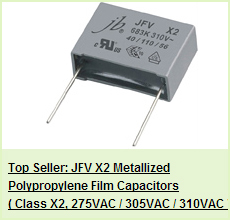2011-1-6 22:43:45
views
In theory, capacitors can be coupled both in series and parallel. If you need a 100MF cap and have two at 50MF, you can connect them in parallel, and that will give you 100MF (and same voltage rating as each). If you couple them in series, you get half the capacitance, and double voltage rating. But coupling electrolytic capacitors in series to get higher voltage rating must generally be discouraged. For this to work, you must be sure that the two (or more) caps share the voltage load properly; a resistor network can augment this, but if leakage currents are markedly different or the capacitors age differently, you are looking at a potential disaster, so do this only as a last resort, if at all.
2011-1-5 22:30:25
views
As already mentioned at previous blog, never go below the voltage rating of the original part. Standards in voltage ratings have changed over the years, so you may not be able to find an exact replacement for the 250V capacitor you want to replace. Instead use 270V or even more. The only adverse effects of using a too high rating is price and, maybe, physical size; small problems compared to the risk of a capacitor impersonating a large firecracker inside your equipment!
Same is true of capacitance values: Standards have changed, and instead of old values like 15MF, 32MF, 50MF, etc, you will find 16, 33, 67, and such. The capacitance values of electrolytic capacitors are normally not very critical to the circuitry function, especially not in filters. A good rule of thumb is to go for the range between -20% to +100% of the original value, of course choosing a value as close as you can get.
There is a caveat here: If those capacitors have already been changed once, the values you look at may already deviate from the original values. If a 260V 40MF capacitor has sometime along the route been replaced with a 450V 67MF, you could be heading for problems; a 650V 100MF replacement will probably work, but we are getting out of bounds (oversize filter caps put extra strain on rectifier tubes, not to mention the price). So it would be nice to make a rough calculation to see if the value we are aiming for is reasonable.
2011-1-5 22:25:39
views
Overvoltage: If the specified voltage is exceeded, current will leak through the isolation, not in a slow way that might regenerate weak areas, but violently, creating hotspots where additional break-down occurs. The danger of explosion is imminent.
Reversed polarity: As described, the inverse of regeneration = self destruction, will occur. If the applied voltage is near the normal (right polarity) working voltage, break-down is quick and violent. The effect of a low inverse voltage might be reversible.
Heat: Heat shortens the life of an electrolytic capacitor. A good rule of thumb is that every 10deg C over 85 will cut the life expectancy in half.
The rules for a long peaceful life are, of course, the opposite. When replacing electrolytic capacitors in old equipment, never, never go below the voltage rating of the original parts. Modern components are usually more compact, so if you cannot get the exact rating, choose a higher one, there will usually be room for it. If wrong polarization or overvoltage has caused an electrolytic capacitor to become hot, discard it. Look out for heat sources, in old power supplies, there is often a large hot drop resistor placed near the filter capacitor, make sure it doesn’t transfer too much heat to the capacitor.
2011-1-5 22:15:42
views
jb capacitors wish you Merry Christmas & Happy New year!
Take this opportunity, recommend you one of our most strong series capacitor--JFB series.
JFB series is a Dipped Metallized Polyester Film capacitors,
pitch size from 10mm to 27.5mm, capacitance from 0.01uF to 10uF, voltage from 100V to 630V
This series crossed Panasonic ECQE, Vishay MKT368, Konek MKT 68, K73-17....in China called CL21..
widely used in electronic ballast, CFL, switch power supply... very popular, big demand in the market due to competitive prices.
Check our datasheet linked below, welcome to ask for quote.
JFB-Metallized Polyester Film capacitors
Datasheet: http://www.jbcapacitors.com/pdf/JFB-Metallized-Polyester-Film-Capacitor.pdf





